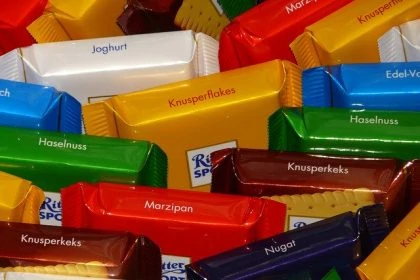Ritter sport keeps its trademark right at square commodity form of the well-known chocolate, judged the BGH some weeks ago. In the now public full judgement the BGH states this as an important leading principle regarding a product shape with functional characteristics.

The German BGH had announced its decision in a press release on July 23, 2020 – we reported. For years, the square shape of Ritter Sport chocolate, which has been protected as a molded trademark since 1995, has been contested by competitor Milka.
The Federal Supreme Court did indeed take into account Ritter Sport’s marketing strategy, with which the company had used the square shape of the packaging as an almost proverbial advertising slogan “Quadratisch. Practical. Good”. However, the shape of a product or packaging is only excluded from trademark protection under § 3 (2) No. 3 MarkenG if it gives the product a significant value – and this is not the case here, the BGH ruled. Ritter Sport retains its trademark right to the square shape of the well-known chocolate.
Full judgement now published
However, the now published full judgement (I ZB 42/19 (in German)) is also important, because in it the BGH formulated an important guiding principle decision regarding a commodity form and product shape with functional characteristics.
The obstacle to protection of § 3 para. 2 No. 3 German MarkenG (engl: trademark law) exists if it is clear from objective and reliable aspects that the decision of the consumer to buy the product in question is determined to a large extent by the fact that the shape of the product gives the product a significant value, the BGH clarified in its full judgement. However, it is not relevant whether the shape of the product has a special economic value for the trademark owner because it has become established in the trade as an indication of the origin of the product.
Public perception not a decisive factor
The BGH even explicitly emphasizes that the perception of the public is not a decisive factor for the assessment whether there is a barrier to protection according to § 3 para. 2 No. 3 MarkenG. According to the leading principle decision of the BGH, the following evaluation criteria are rather decisive:
- the nature of the category of goods in question,
- the artistic value of the form in question,
- their otherness compared to other forms generally used in the respective market,
- a significant price difference compared to similar products
- and also the elaboration of a marketing strategy that mainly emphasizes the aesthetic qualities of the product in question.
However, the BGH ruled that Ritter Sport’s marketing strategy, which is undoubtedly based on the shape of the goods, does not in the present case lead to the fact that this shape of goods confers a substantial value on the goods. The square shape of the packaging has no particular artistic value and does not lead to significant price differences compared to similar products.
Also applies to fabric shape with functional features
Equally important is the addition of the Federal Supreme Court’s ruling that the obstacle to protection under § 3 (2) No. 3 MarkenG does not only apply to the shape of goods which have a purely artistic or decorative value, but also to a shape of goods with functional characteristics.
The same applies to a shape of goods which, in addition to an important aesthetic element, also has essential functional characteristics, the BGH decided as part of its leading decision.
Extension by subsequent grounds for cancellation
Finally this case also touched a fundamental question in the trademark cancellation procedure, also for this the BGH formulated a guiding principle decision. It concerned the clarification whether an extension by additional, but subsequent grounds for cancellation would be included in the current proceedings.
According to § 54 (2) MarkenG, it does not follow from § 54 (2) MarkenG that an extension of the subject matter of the dispute by additional grounds for cancellation is inadmissible in trademark cancellation proceedings, the BGH ruled.
De facto this means that if cancellation proceedings are already pending and further grounds for cancellation are asserted, these will become the subject matter of the current proceedings without initiating new cancellation proceedings. Therefore, the BGH explained that the subsequent grounds for cancellation do not have to be objected to within two months in order to prevent a cancellation.
Do you want to protect or defend your trademark?
Our lawyers will be happy to advise you. Please contact us if you are interested – we look forward to your call!
Sources:
Judgement of BGH ‘Ritter Sport’, I ZB 42/19 (in German)
Image:








Leave a Reply